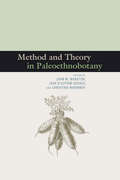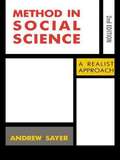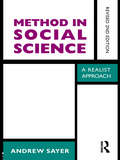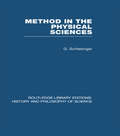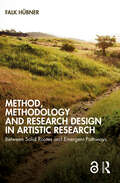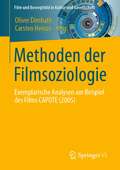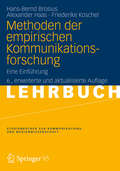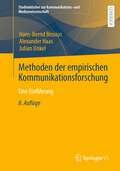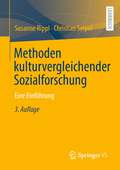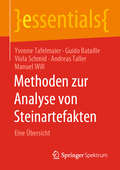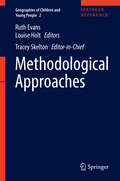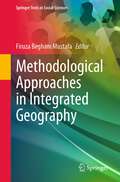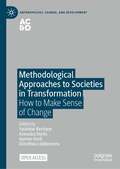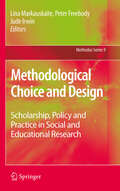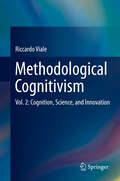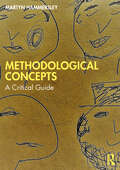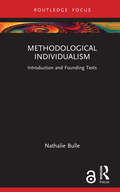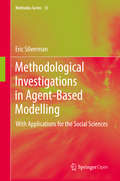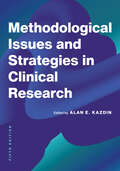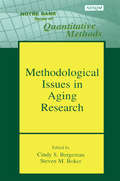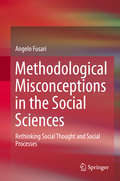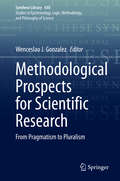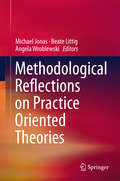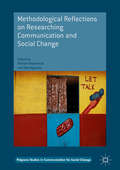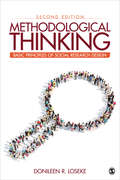- Table View
- List View
Method and Theory in Paleoethnobotany
by John M. Marston, Jade d’Alpoim Guedes, and Christina WarinnerPaleoethnobotany, the study of archaeological plant remains, is poised at the intersection of the study of the past and concerns of the present, including agricultural decision making, biodiversity, and global environmental change, and has much to offer to archaeology, anthropology, and the interdisciplinary study of human relationships with the natural world. Method and Theory in Paleoethnobotany demonstrates those connections and highlights the increasing relevance of the study of past human-plant interactions for understanding the present and future. A diverse and highly regarded group of scholars reference a broad array of literature from around the world as they cover their areas of expertise in the practice and theory of paleoethnobotany—starch grain analysis, stable isotope analysis, ancient DNA, digital data management, and ecological and postprocessual theory. The only comprehensive edited volume focusing on method and theory to appear in the last twenty-five years, Method and Theory in Paleoethnobotany addresses the new areas of inquiry that have become central to contemporary archaeological debates, as well as the current state of theoretical, methodological, and empirical work in paleoethnobotany.
Method in Social Science: A Realist Approach (2nd edition)
by Andrew SayerMethod in Social Science was widely praised on its first publication for providing a series of penetrating reflections on central questions in social science discourse. This second edition directly reflects new developments in the areas of philosophy and methodology. Sayer has rewritten and substantially enlarged the introduction, clarifying many of the arguments that appear in the text. There is also a short discussion of the importance of narrative form, particularly useful for students concerned with the problems of writing, composition, and presentation of their own material.
Method in Social Science: Revised 2nd Edition
by Andrew SayerIn its second edition, Method in Social Science was widely praised for its penetrating analysis of central questions in social science discourse. This revised edition comes with a new preface and a full bibliography. The book is intended for students and researchers familiar with social science but having little or no previous experiences of philosophical and methodological discussion, and for those who are interested in realism and method.
Method in the Physical Sciences (Routledge Library Editions: History & Philosophy of Science)
by G SchlesingerOriginally published in 1963. Can one discern certain regularities in the manoeuvrings and techniques employed by scientists and can these be formulated into the methodological principles of science? What is the origin and basis of such principles? Are they imposed by objective realities, do they derive from conceptual necessities or are they rooted in our own deep seated predilections? This volume investigates these questions and sheds light on the growth mechanism of the evolving structure of science itself.
Method, Methodology and Research Design in Artistic Research: Between Solid Routes and Emergent Pathways
by Falk HübnerMethod, Methodology and Research Design in Artistic Research: Between Solid Routes and Emergent Pathways offers a rich and innovative approach to method, research design and methodology of research in and through the arts. It spans the process from initial research design, ongoing and continuous decisions that need to be made while designing and carrying out research up to the analysis and reflection on this process when finished.Drawing on a huge body of experience, examples of renowned artist-researchers in the international field, as well as on contemporary posthumanist philosophy and methodological literature in the humanities and social sciences in particular, the conceptual core of the book is the author's Common Ground model for research design: Hübner suggests a flexible approach both for the overall research design as well as for the from-scratch design of distinct methods. This means in particular to provide space for the unknown, and for the occasional messiness of research in and through the arts; the book provides a thorough exploration of the emergent aspects and unforeseen paths that come up during a research trajectory.Transdisciplinary in scope, this is not just a book "about", but "to work with" methodology, supporting both seasoned and early career researchers, as well as supervisors in graduate, post graduate and doctoral education contexts.
Methoden der Filmsoziologie: Exemplarische Analysen am Beispiel des Films CAPOTE (2005) (Film und Bewegtbild in Kultur und Gesellschaft)
by Oliver Dimbath Carsten HeinzeDie Beiträge dieses Bandes gehen aus einem Symposion zur Analyse des Spielfilms CAPOTE (2005) hervor, das Vertreterinnen und Vertreter unterschiedlicher filmsoziologischer Methoden und Zugänge zusammengebracht hat. Die Fokussierung auf einen Film gewährt einen vergleichenden Blick auf verschiedene Verfahren und die Reichweite ihrer Interpretations- und Deutungspotenziale. Unter den behandelten Ansätzen finden sich Positionen der filmgestützten Interaktionsanalyse, der Seduktionstheorie oder der biografischen Filmanalyse.
Methoden der empirischen Kommunikationsforschung
by Friederike Koschel Alexander Haas Hans-Bernd BrosiusDieses Buch ist eine Einführung in die wesentlichen Methoden der empirischen Kommunikationswissenschaft. Es wendet sich insbesondere an Studierende der Kommunikations- und Medienwissenschaft, die erste Erfahrung mit empirischen Methoden sammeln, und eignet sich als vertiefende Begleitung einführender Vorlesungen und als praxisorientierte Handreichung für Methodenübungen. Leichte Verständlichkeit, Anwendungsorientierung und eine klare Gliederung sind die Haupteigenschaften dieses Lehrbuchs.
Methoden der empirischen Kommunikationsforschung: Eine Einführung (Studienbücher zur Kommunikations- und Medienwissenschaft)
by Alexander Haas Hans-Bernd Brosius Julian UnkelDas Standardwerk ist eine Einführung in die wesentlichen Methoden der empirischen Kommunikationswissenschaft. Es wendet sich insbesondere an Studierende der Kommunikations- und Medienwissenschaft, die erste Erfahrung mit empirischen Methoden sammeln und eignet sich als vertiefende Begleitung einführender Vorlesungen und als praxisorientierte Handreichung für Methodenübungen. Leichte Verständlichkeit, Anwendungsorientierung und eine klare Gliederung sind die Haupteigenschaften dieses Lehrbuchs. Für die achte Auflage wurde der Band überarbeitet und erweitert, vor allem im Hinblick auf automatisierte Verfahren der Datenerhebung und -analyse. Dies trägt der zunehmenden Bedeutung von Verfahren der „Computational Communication Science“ Rechnung. Beispiele wurden aktualisiert und auf geschlechtersensible Sprache Wert gelegt.
Methoden kulturvergleichender Sozialforschung: Eine Einführung
by Susanne Rippl Christian SeipelDer Kulturvergleich erlangt im Zuge der Globalisierung und Internationalisierung vieler Lebensbereiche eine zunehmende Bedeutung. Deutschsprachige Lehrbücher zu diesem Thema gibt es jedoch kaum. Diese Lücke schließt das vorliegende Buch. Das Ziel des Bandes ist es, eine praxisorientierte Einführung in die Methoden kulturvergleichender Forschung vorzulegen. Dabei werden insbesondere die Möglichkeiten und Grenzen kulturvergleichender Surveyforschung behandelt. Das Buch bietet eine solide Basis für einen kritischen Umgang mit kulturvergleichenden Studien, es vermittelt aber auch grundlegende Kenntnisse für die eigene Durchführung kulturvergleichender Forschung.
Methoden zur Analyse von Steinartefakten: Eine Übersicht (essentials)
by Yvonne Tafelmaier Guido Bataille Viola Schmid Andreas Taller Manuel WillDieses essential gibt einen Überblick über aktuelle Analysemethoden von Gesteinsartefakten von der Attributanalyse ganzer Inventare bis hin zu mikroskopischen Gebrauchsspurenanalysen einzelner Artefakte. Dabei zeigen die vorgestellten Ansätze die Bandbreite der Analyse urgeschichtlicher Steinartefakte im deutschsprachigen Raum. Einfache Anwendungsbeispiele veranschaulichen die Möglichkeiten und Einschränkungen der jeweiligen Methode. Der Inhalt und die Struktur des essentials ist identisch mit Unterrichtseinheiten zur Erlernung von Methoden der Steinartefaktanalyse an der Universität Tübingen im Fachbereich Ältere Urgeschichte.
Methodological Approaches
by Ruth Evans Louise HoltThis volume presents the innovative methodologies, tools and techniques, as well as the challenges and ethical complexities of doing geographies of young people. Geographers of young people have reflected upon participation, power and how to approach young people, generating a vibrant and exciting methodological terrain, which this volume showcases. Understanding young people's lives has challenged researchers to be creative in their research approaches. Facilitating research with, and alongside, young people and acknowledging, and endeavouring to address, adult-child power imbalances has prompted innovation, experimentation and adaptation which has applicability to all social scientists and geographers. The volume provides critical insights into underlying epistemological and ethical debates, along with practical methods and techniques that investigate young people's geographies globally, across both majority and minority worlds. Many of the chapters consider how to facilitate participation and empowerment through the research process, and geographies of young people have a long tradition of co-production and participation in research. The collection is structured into three sections with a focus on: methodological approaches and ethics; methods, tools and techniques; co-production, participation and power. In the first section, key epistemological and methodological approaches are considered, such as critical realism, and critical pedagogy, with discussion of their implications for research design and analysis. In the second section, chapters explore the potential and challenges of a variety of innovative participatory tools: mobile technologies, geospatial methods, creative visual methods, participatory video. In the third section, chapters reflect on endeavours to promote more empowering, co-productive research including rights-based research, young people as researchers, and community engagement with young people. The collection highlights the specific methodological and ethical issues raised by relatively neglected techniques, such as archival research, autoethnography, qualitative longitudinal research and mobile interviewing. It addresses how barriers to participation with groups who are often more silenced and marginalised can be addressed, such as when conducting research with migrant and asylum seeking children in the minority world and with street youth and disabled young people in the majority world. The volume explores issues of data analysis, interpretation and dissemination, such as interpreting visual ethnography and the process of participatory dissemination.
Methodological Approaches in Integrated Geography (Springer Texts in Social Sciences)
by Firuza Begham MustafaThis book covers methodology of the study for all aspects of human geography. As a comprehensive geography textbook, it consists of detailed research methodology for research in human geography including a few selected case studies in Asia. It explores different approaches, methodological possibilities, and challenges in conducting geographical research in human geography. New digital geographic data sources and GIS applications can help researchers to receive clearer concepts and obtain better measurements of the relevant attributes changes. Furthermore, the book provides an opportunity to critically examine the conceptualization and identification of the field in geographical research and how digital media has not only expanded the scope of what constitutes the field but has redefined the field in itself as well as the practices of observing, knowing, and analyzing the real world. The uniqueness of this book is due to the contribution of several professors and subject experts from South East and East Asia with special particular reference to cases studies from this region of the world.
Methodological Approaches to Societies in Transformation: How to Make Sense of Change (Anthropology, Change, and Development)
by Aymon Kreil Yasmine Berriane Annuska Derks Dorothea LüddeckensThis open access book provides methodological devices and analytical frameworks for the study of societies in transformation. It explores a central paradox in the study of change: making sense of change requires long-term perspectives on societal transformations and on the different ways people experience social change, whereas the research carried out to study change is necessarily limited to a relatively short space of time. This volume offers a range of methodological responses to this challenge by paying attention to the complex entanglement of qualitative research and the metanarratives generally used to account for change. Each chapter is based on a concrete case study from different parts of the world and tackles a diversity of topics, analytical approaches, and data collection methods. The contributors’ innovative solutions provide valuable tools and techniques for all those interested in the study of change.
Methodological Choice and Design
by Lina Markauskaite Peter Freebody Jude IrwinBeginning and well-seasoned researchers alike face significant challenges in understanding the complexities of research designs arising from both within and across methodological paradigms, and in applying them in ways that maximise impact on knowledge, practice, and policy. This volume engages educational and social researchers in a scholarly debate offering some crucial re-interpretations of established research methodologies in light of contemporary conditions and critical introduction to some contemporary research approaches yet to gain general recognition. This book is a contemporary vademecum for researchers, practitioners and graduate students on research methodologies and designs for educational and social change in today's world. The chapters chart and analyse the conceptual and practical complexities of a variety research designs for contemporary educational and social work research. This anthology, taken overall, provides readers with the knowledge and understanding needed not only to design technically sound and coherent research studies, but also to develop methodologically innovative research projects that cross the boundaries between different methodological traditions to the benefit of scholarship, policy, and practice. The chapters cover nine research approaches: - Design-based research - Action research - Ethnomethodological research - Negotiated ethnography - Arts-informed research - Historical analysis and postcolonial scholarship - Policy analysis - Comparative research - Quantitative modelling of correlational and multi-level data The book provides a critical discussion of epistemological questions and methodological frontiers: - Knowledge and epistemology in scholarship, practice and policy - Digital knowledge and digital research - Emerging methodological challenges for educational research - Challenges and futures for social work and social policy research methods - Methodology and the knowledge industry
Methodological Cognitivism
by Riccardo VialeThis book deals with the cognitive foundation of the theory of social action. The social sciences are still guided by models of social action, far from the empirical reality of the psychology of action. While economics seems to have made greater progress in accepting the changes to the theory of action derived from cognitive science (see, for example, the 2002 Nobel prize for economics awarded to Daniel Kahneman), sociology is still being oriented on the dualism of hermeneutics vs. structuralism, which leaves very little room for a cognitive theory of social action. The unique features of the book are its combination of epistemology, philosophy of mind and cognitive science in order to renew and overcome the limits of the current methodologies of social science and in particular methodological individualism. Methodological cognitivism is proposed as an alternative to the holistic character of structuralism, to the intentionalist and rationalist features of methodological individualism, and to the relativistic character of hermeneutics and ethnomethodology.
Methodological Concepts: A Critical Guide
by Martyn HammersleyMethodological Concepts: A Critical Guide clarifies many key terms and issues in social research methodology. It outlines the conventional meanings of these terms, but also addresses their contentious character. The aim is to offer interpretations of them that provide a coherent conception of the nature of social science. This book is premised on the idea that more clarity about the meaning of major methodological concepts is essential, and that the disagreements which pervade the field must be addressed. Numerous key terms are discussed across 13 chapters, including ‘methodology’, ‘method’, ‘inquiry’, ‘research’, ‘science’, ‘truth’, ‘fact’, ‘rigour’, ‘bias’, ‘objectivity’, ‘data’, ‘evidence’, ‘induction’, ‘deduction’, ‘abduction’, ‘understanding’, ‘explanation’, ‘reflexivity’, ‘triangulation’, ‘theory’, and ‘researcher integrity’. These concepts have been implicated in fundamental divisions among social scientists, exemplified by the ‘paradigm wars’ of the past few decades. The chapters of this book provide an overview of the various meanings given to these terms, whilst also offering distinctive interpretations designed to provide a sound basis for social research. Methodological Concepts: A Critical Guide will be of great use to any student or researcher working in the social sciences.
Methodological Individualism: Introduction and Founding Texts (Routledge Studies in Social and Political Thought)
by Nathalie BulleOriginating in the late 19th century and becoming the subject of ongoing methodological debates in the social sciences, methodological individualism is a paradigm that focuses on understanding social phenomena through the actions and choices of individuals rather than through collective explanations. This book highlights its theoretical bases as defined and developed in the writings of its founders and early proponents in the context of the liveliest methodological battles in the social sciences. It addresses fundamental epistemological issues, including the distinction between explanation in the social sciences and natural sciences, the rational bases for understanding social actions, the relation of social wholes to their parts, and the connections between social concepts and the phenomenal world. Bringing together new English translations of foundational texts by Carl Menger, Joseph Schumpeter, Georg Simmel, and Max Weber, this book provides key insights into one of the essential methodological paradigms in the social sciences, corrects misconceptions, and advances a deeper understanding of methodological individualism as a robust and valuable approach to explaining social phenomena. It will therefore appeal to scholars and students of sociology and sociological theory with an interest in questions of social science methodology.
Methodological Investigations in Agent-Based Modelling: With Applications For The Social Sciences (Methodos Ser. #13)
by Daniel Courgeau Jakub Bijak John Bryden Eric Silverman Robert Franck Jason Hilton Jason NobleThis open access book examines the methodological complications of using complexity science concepts within the social science domain. The opening chapters take the reader on a tour through the development of simulation methodologies in the fields of artificial life and population biology, then demonstrates the growing popularity and relevance of these methods in the social sciences. Following an in-depth analysis of the potential impact of these methods on social science and social theory, the text provides substantive examples of the application of agent-based models in the field of demography. This work offers a unique combination of applied simulation work and substantive, in-depth philosophical analysis, and as such has potential appeal for specialist social scientists, complex systems scientists, and philosophers of science interested in the methodology of simulation and the practice of interdisciplinary computing research.
Methodological Issues and Strategies in Clinical Research
by Alan E. KazdinNow in its fifth edition, this classic text helps readers learn how to design, conduct, analyze, and report high-quality clinical studies. Alan E. Kazdin brings together a wide array of authoritative articles with his own expert insights to illustrate fundamental issues research in an accessible manner, including generating ideas, selecting participants, randomization, selecting assessment measures, analyzing data, and evaluating the implications of and publishing the results. New to this edition are articles emphasizing the importance of diversity in research, not only cultural diversity among study participants but also in methodology (including quantitative, qualitative, and mixed methods); the role of big data; using technology such as artificial intelligence and apps; and strategies to improve transparency and accessibility, including open science practices, replication, and preregistration. From generating hypotheses for study and selecting appropriate assessments to interpreting data and presenting findings, readers will come to better understand the whole research process as well as the importance of ethics and scientific integrity.
Methodological Issues in Aging Research (Notre Dame Series on Quantitative Methodology)
by Steven M. Boker Cindy S. BergemanMethodological Issues in Aging Research is the first volume in the "Notre Dame Series on Quantitative Methodology." This new series provides practical training on the latest quantitative methods used in social and behavioral research. Each volume features contributions from leading experts in state-of-the-art techniques applicable to a selected substantive topic.The first series volume provides researchers with innovative techniques for the collection and analyses of data focusing on aging and lifespan development. The book addresses such techniques as structural equation modeling, latent class analysis, hierarchical linear growth curve modeling, dynamical systems analysis, multivariate Rasch models, survival analysis, multilevel modeling, and quantitative genetic methods. These new techniques provide: better estimates of the direct effect of environmental or treatment effects and the dynamic pattern of genetic and environmental influences on adult development more precise predictions of outcomes which in turn increase the diagnostic power of test instruments the potential for developing new treatments that take advantage of the intrinsic dynamics of the course of a disease or age-related change to enhance treatment Methodological Issues in Aging Research appeals to advanced students and researchers in lifespan development, gerontology, health psychology, and other fields related to human development. It can be used as a main or supplemental text for advanced courses related to developmental research methods.
Methodological Misconceptions in the Social Sciences
by Angelo FusariThis book offers a systematic view of social analysis that will advance the communication of results between different academic disciplines. It overcomes misunderstandings that are due to the use of an unstructured variety of methodological traditions in the analysis of complex socioeconomic and political processes. The book focuses on the special features of human society: humans as subjects, non-repetitiveness and irreversibility of social actions and the peculiar relations between necessity and possibility in human action. It defines methodological criteria, procedures and rules that enable researchers to select and classify realistic hypotheses to derive general principles and basic organizational features. It then applies these criteria in critical reviews of major theories and interpretations of society and history, offering clarifications and alternative proposals with regard to crucial aspects of anthropological, political, juridical, sociological and religious thought.
Methodological Prospects for Scientific Research: From Pragmatism to Pluralism (Synthese Library #430)
by Wenceslao J. GonzalezThis book highlights the existence of a diversity of methods in science, in general, in groups of sciences (natural, social or the artificial), and in individual sciences. This methodological variety is open to a number of consequences, such as the differences in the research according to levels of reality (micro, meso and macro), which leads to multi-scale modelling and to questioning “fundamental” parts in the sciences, understood as the necessary support for the whole discipline. In addition, this volume acknowledges the need to assess the efficacy of procedures and methods of scientific activity in engendering high quality results in research made; the relevance of contextual factors for methodology of science; the existence of a plurality of stratagems when doing research in empirical sciences (natural, social and of the artificial); and the need for an ethical component while developing scientific methods, because values should have a role in scientific research. The book is of interest to a broad audience of philosophers, academics in various fields, graduate students and research centers interested in methodology of science.
Methodological Reflections on Practice Oriented Theories
by Beate Littig Michael Jonas Angela WroblewskiThis volume presents a comprehensive overview of methodological issues and empirical methods of practice-oriented research. It examines questions regarding the scope and boundaries of practice-oriented approaches and practice theory. It discusses the potential advantages and disadvantages of the diversity resulting from the use of these approaches, as well as method and methodology-related issues. The specific questions explored in this volume are: What consequences are linked to the application of a praxeological perspective in empirical research when it comes to the choice of methods? Is there such a thing as an ideal path to follow in praxeological empirical research? What relationship is there between qualitative and quantitative approaches? What differentiates practice-based social research from other perspectives and approaches such as discourse analysis or hermeneutics? The contributions in this book discuss these questions either from a methodological point of view or from a reflective perspective on empirical research practices.
Methodological Reflections on Researching Communication and Social Change (Palgrave Studies in Communication for Social Change)
by Norbert Wildermuth Teke NgombaThis book identifies the strengths and weaknesses of different methodological approaches to research in communication and social change. It examines the methodological opportunities and challenges occasioned by rapid technological affordances and society-wide transformations. This study provides grounded insights on these issues from a broad range of proficient academics and experienced practitioners. Overall, the different contributions address four key themes: a critical evaluation of different ethnographic approaches in researching communication for/and social change; a critical appraisal of visual methodologies and theatre for development research; a methodological appraisal of different participatory approaches to researching social change; and a critical examination of underlying assumptions of knowledge production within the dominant strands of methodological approaches to researching social change. In addressing these issues through a critical reflection of the methodological decisions and implications of their research projects, the contributors in this book offer perspectives that are highly relevant for students, researchers and practitioners within the broad field of communication for/and social change.
Methodological Thinking: Basic Principles of Social Research Design
by Donileen R. LosekeFocused on the underlying logic behind social research, Methodological Thinking: Basic Principles of Social Research Design by Donileen R. Loseke encourages readers to understand research methods as a way of thinking. The book provides a concise overview of the basic principles of social research, including the characteristics of research questions, the importance of literature reviews, variations in data generation techniques, and sampling. The Second Edition includes a revised chapter on research foundations, with focus on the philosophy of science and ethics; an emphasis on critical thinking; additional attention to evaluating research; and a new selection of briefer, multidisciplinary journal articles designed to be accessible to a wide variety of readers.
